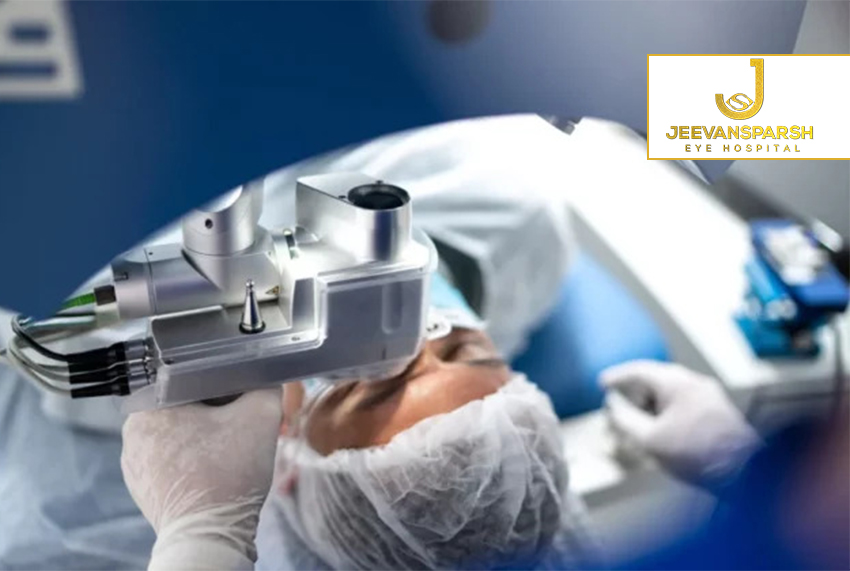The Complete Overview of Cataract Surgery in Pune, Including Procedures, Aftercare, and the Improvement of One’s Vision
Have you been finding that your vision has been foggy or fuzzy as of late? Have you discussed the possibility of cataract surgery with your eye doctor? If this describes you, you are not alone; cataracts are a condition that affects millions of individuals all over the world. The good news is that cataract surgery, which is performed to restore clear eyesight, is a frequent technique that has a very high success rate.
We will walk you through all you need to know about cataract surgery in Pune in this detailed guide that we have put up for you. We will walk you through the most effective techniques that are available, how to be ready for your operation, what to anticipate during the recuperation process, and the significant enhancements that you can anticipate in your vision after surgery. Continue reading for some helpful hints and pointers to guarantee that your cataract surgery goes off without a hitch from beginning to end!

Would You Benefit from Having Cataract Surgery?
Before we get into the specifics, we recommend that you first determine whether or not cataract surgery is the best option for your eyes by answering the following questions:
In the event that you responded “yes” to any of the questions presented above, cataract surgery may be able to assist in dramatically improving your vision. It is important that you [discuss the matter with your ophthalmologist] in order to find out if you are a suitable candidate for this risk-free and efficient surgery.
Understanding Cataracts Before we go any further, let’s make sure that we have a complete comprehension of what cataracts are. Cataracts are cloudings that form in the lens of your eye, which can cause vision to become cloudy or fuzzy. They can expand with time, making it more difficult for light to enter your eye in the correct manner and causing your symptoms to become progressively worse.
Cataracts are not reversible through measures such eye glasses, contacts, or medicine. Despite the fact that cataracts are relatively frequent, particularly among people over the age of 60. The only treatment for this condition is surgery, which consists of removing the hazy lens and replacing it with an artificial lens that is clear. The good news is that cataract surgery may now be performed in a relatively short amount of time as an outpatient treatment, which reduces the risk of complications to a minimum and results in almost immediate improvements in vision.
Identifying the Most Appropriate Method of Cataract Surgery for You
Ophthalmologists in Pune provide a diverse selection of cutting-edge cataract surgical procedures in order to cater to the specific requirements of each individual patient. The following are some of the most often performed procedures:
The process of phacoemulsification
This technique makes a tiny incision in the eye and then employs ultrasonic waves with a high frequency to break up and remove the clouded lens. It’s the method that’s used the most frequently and is the one most doctors recommend.
Laser-Assisted Cataract Surgery Performed With a Femtosecond Laser
Laser pulses are used in this cutting-edge method to make precise incisions in the eye, which are then used to remove the lens. It offers increased precision in addition to granular customisation.
Implantation of Multifocal Lenses

These lenses of the next generation enable clear vision at a variety of distances, thereby reducing the need for patients to wear glasses following surgery.
When deciding which method to use, your ophthalmologist will take into account a variety of factors, including the nature of the cataract, its size and degree of density, the structure of your eye, as well as your visual requirements. Before deciding on the best course of action, you should talk to your doctor about your current lifestyle and your long-term goals.
The following is a brief pricing comparison of some of the most common cataract surgery treatments performed in Pune:
Even if more advanced technology comes at a little greater price, the value that is delivered in terms of visual precision and personalization makes it more than worthwhile for many patients to pay for it. The vast majority of treatments are covered by insurance.
Getting Ready for the Cataract Operation
The weeks leading up to your procedure are extremely important for laying the groundwork for a cataract removal that is both safe and successful. The following is a list of important things to keep in mind before to surgery:
Get a pre-operative eye exam so that your eye health and visual requirements can be evaluated.
Reduce the amount of rigorous exercise you do to lower your chance of infection.
To lessen the inflammation in your eyes, use the eye drops as directed by your doctor.
Put away your contact lenses and pick up a pair of glasses instead.
Prepare for postoperative care and transportation by making the necessary preparations.
Avoid taking any medications that could potentially cause complications during anesthesia.
Before your surgery, the doctor may recommend that you take an over-the-counter pain medicine.
In order to get the best possible outcomes from your cataract surgery, you should make sure to follow all of the appropriate protocols before and after the treatment. Be conscientious about your pre-operative care and make sure you don’t miss any of the appointments coming up to the big day.
How to Take Care of Your Eyes After Surgery
You will notice a considerable improvement in your vision very immediately after having your cataracts surgically removed. However, the healing process takes some time, and it is essential that you follow your surgeon’s instructions during the weeks that follow the treatment. Care after surgery should be approached with the following in mind:
- Follow the instructions for using the antibiotic and anti-inflammatory eyedrops.While you sleep, protect your eyes from getting irritated by wearing an eye shield.
- Take frequent breaks from reading or gazing at devices to reduce the amount of eye strain you experience.
- Stay away from anything that requires a lot of effort for at least a week.
- Make sure to follow up as quickly as possible with post-op checkups according to the timetable.
- If you are experiencing extreme discomfort, discharge, or a loss of vision, you should contact your doctor as soon as possible.
In the immediate aftermath of surgery, you can have some little discomfort, itching, or sensitivity to light. This usually gets better during the next couple of days. The area around the eye may also swell, but this symptom typically goes away after a few weeks.
You can ensure maximum recovery and enjoy your drastically improved eyesight free of cataracts if you take good care of yourself and follow up with your doctor often.
The Difference Between Day and Night Vision Before and After Cataract Surgery
Patients are frequently astonished by the sudden improvements in their eyesight, which can be seen even on the same day as surgery in some cases. After the clouded lens has been removed, the eye once again receives the correct amount of light, which results in visuals that are more distinct, vivid, and transparent.
The following are some examples of the profound changes that cataract sufferers in Pune have reported experiencing:
A more vibrant palette
Many people instantly note that colors appear to be more vibrant and rich after surgery. The world rediscovers its vibrant colors after having had them muted by the cloudy lens for a while.
Enhanced Perception
After having cataracts removed, activities such as reading small text, seeing street signs, and watching TV are all made simpler by the improvement in eyesight.
Reduced glare
Following surgery, the excessive glare that generated halo effects around lights and made it difficult to drive at night has been greatly decreased.
Less Reliance on Contact Lenses and Glasses

Even while you might still need glasses for reading or distance vision following surgery, the likelihood of your needing them is significantly reduced.
Take a look at this representation of how a cataract can impair vision before and after its removal, and compare it to the clarity that results from the cataract no longer being present:
There is no denying the progress that has been made! Surgery to remove cataracts can quite literally give you a whole new perspective on life, as your vision will become sharper, clearer, and more colorful after the procedure.
Why Cataract Surgery Should Be Performed in Pune Rather Than Anywhere Else
Those in need of this vision-restoring operation often find that undergoing cataract removal in Pune is the best option due to the numerous benefits offered by this location. The following is a list of the most important advantages:
Surgeons on the World Stage
Ophthalmologists and eye surgeons of the highest caliber may be found in Pune, which is located in India. Specialists that have received extensive training in cataract removal employ cutting-edge methods and technologies to ensure accurate treatment and favorable outcomes.
Premier medical facilities and clinics
Major multi-specialty hospitals such as Aditya Birla Memorial Hospital and specialized eye care clinics such as Drishti Eye Care both boast excellent reputations for their treatment of thousands of patients suffering from cataracts.
Because of its convenient central location, Pune is easily accessible by air, rail, and road. It is convenient for patients who are traveling from out of town.
The Accessibility of More Advanced Technology
Patients in need of cutting-edge treatment options can find it in Pune, where ophthalmologists provide modern cataract procedures such as femtosecond laser and premium lenses.
Costs That Are Reasonable
When compared to cataract surgery performed elsewhere, the treatment available in Pune is of extraordinary quality and costs a fraction of what it would outside.
On this map, you’ll find some of the most highly regarded eye hospitals in Pune:
Those in need of cataract removal will find that Pune’s exceptional healthcare infrastructure, well-known ophthalmologists, and accessibility make it the best destination to have the procedure done.
Cataract Surgery has the potential to drastically improve one’s vision.
We really hope that you have gained a comprehensive understanding of contemporary cataract surgery through the use of this book. You now have all of the knowledge required for a successful surgery and visual outcome, which includes selecting the appropriate technique, planning for the operation, providing correct post-op care, and ensuring sufficient follow-up care.
Although recovery from any eye treatment requires patience, the life-changing gains in vision that are reported by the majority of patients after cataract removal are well worth the wait. You will once more be able to take pleasure in unobstructed everyday activities as well as crystal-clear vision.
Do you have any interest in undergoing another operation similar to LASIK? Check out these more resources that are available to you:
We encourage you to make an appointment for a consultation with one of the most well regarded ophthalmologists in Pune in order to ascertain whether or not cataract surgery, or any other form of vision correction treatment, could assist you in accomplishing your objectives. Your eyesight is something you should only commit to trustworthy medical professionals who have a demonstrated track record of success.
We want to wish you the best of luck as you continue your path toward clearer eyesight and more comfort! Please don’t hesitate to get in touch with us if there are any further questions or concerns you want answered.

